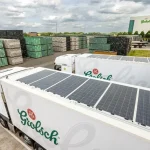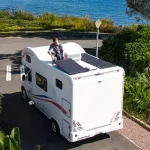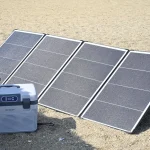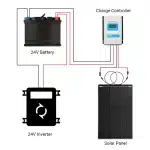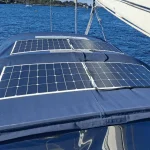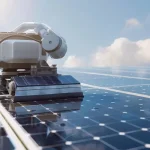As RVing continues to grow in popularity, many RV owners are looking for sustainable ways to power their appliances while on the road. One of the most commonly asked questions is how to power an RV air conditioner without relying on gas generators or campground hookups. The solution? An rv solar ac system. By harnessing the power of the sun, RVers can run their air conditioners and other essential systems off-grid, creating a more eco-friendly, cost-efficient, and quieter way to stay cool during the summer months.
In this guide, we’ll walk you through the essential components of an RV solar AC system, including solar panels, inverters, and battery banks, all designed to work seamlessly together. Whether you’re new to solar power or looking to upgrade your current setup, understanding how to properly size and install a solar-powered air conditioning system for your RV is crucial. This article will provide you with the knowledge you need to enjoy comfortable temperatures and a more sustainable RV lifestyle, no matter where the road takes you.
Table of Contents
Can I Run My RV Air Conditioner on Solar Power?
Yes, you can run your RV air conditioner on solar power, but it requires the right setup to meet the energy demands of the AC. Solar power is a great option for those who want to camp off-grid or reduce their reliance on gasoline-powered generators. However, you’ll need more than just solar panels to power an air conditioner effectively.
An RV air conditioner typically requires a significant amount of power—usually between 1,000 to 2,000 watts. To power it with solar, you’ll need solar panels, a reliable battery bank, and an inverter that can handle the AC’s power surge when it starts.
Can I Run My RV Air Conditioner on Solar Power?
Running an air conditioner directly from a solar panel is not feasible. Here’s why:
DC vs. AC Power: Solar panels produce direct current (DC) electricity, while most RV air conditioners require alternating current (AC). This mismatch means that you need an inverter to convert the DC from the solar panel into AC electricity that the air conditioner can use.
Inverter Role: The inverter is essential because it changes the power from the solar panel into the right format for your AC. Additionally, most air conditioners require a surge of power to start, which is higher than the continuous running power. A high-capacity inverter can handle this surge and provide a stable supply of electricity to the AC unit.
Energy Storage: Solar panels don’t work at night or during cloudy days, so you’ll also need a battery bank to store energy for times when the sun isn’t shining.
To summarize, while you can’t run an AC unit directly from a solar panel, you can power it using a complete solar system that includes panels, an inverter, and a battery storage system.
Components Needed to Run an RV Air Conditioner with Solar
To run your RV air conditioner with solar power, you’ll need several key components:
Solar Panels: These capture sunlight and convert it into DC electricity. The number of panels you need will depend on the power consumption of your air conditioner and your location’s sun exposure.
Inverter: This device converts the DC power from the solar panels into AC power that your air conditioner can use. It must be able to handle the power surge when the AC starts.
Battery Bank: To store energy generated during the day for use at night or during cloudy weather, you’ll need a battery bank. Lithium-ion batteries are the preferred choice for their efficiency and long lifespan.
Charge Controller: This regulates the flow of electricity from the solar panels to the batteries to prevent overcharging, ensuring the longevity of your battery bank.
Wiring and Mounting Equipment: You will also need the appropriate wiring, junction boxes, and mounting hardware for the panels.
What Size Solar Generator Do You Need to Run an Air Conditioner?
To run your RV air conditioner with solar power, you’ll need several key components:
Solar Panels: These capture sunlight and convert it into DC electricity. The number of panels you need will depend on the power consumption of your air conditioner and your location’s sun exposure.
Inverter: This device converts the DC power from the solar panels into AC power that your air conditioner can use. It must be able to handle the power surge when the AC starts.
Battery Bank: To store energy generated during the day for use at night or during cloudy weather, you’ll need a battery bank. Lithium-ion batteries are the preferred choice for their efficiency and long lifespan.
Charge Controller: This regulates the flow of electricity from the solar panels to the batteries to prevent overcharging, ensuring the longevity of your battery bank.
Wiring and Mounting Equipment: You will also need the appropriate wiring, junction boxes, and mounting hardware for the panels.
How Long Can a Solar Generator Run an AC?
The runtime of an air conditioner powered by a solar generator depends on several factors:
Battery Capacity: For example, if your AC consumes 1,500 watts per hour and you have a 400Ah battery bank, the AC could run for approximately 4-5 hours on battery power alone before needing to recharge.
Solar Panel Output: If your solar panels generate enough energy to keep the battery charged during the day, the AC can run indefinitely as long as there is sunlight.
Energy Efficiency: Using a high-efficiency inverter and solar panels, and ensuring that your air conditioner is energy-efficient, can extend the runtime.
It’s important to note that smaller AC units will obviously run longer than larger ones, so adjusting your system to your specific needs is crucial.
Is It Worth Using Solar for Your RV Air Conditioner?
The decision to use solar power for your RV air conditioner depends on several factors, including:
Initial Investment: A solar setup with panels, inverter, and batteries can cost between $2,000 to $5,000. However, over time, it can save money by eliminating the need for gasoline-powered generators.
Environmental Benefits: Solar power is a clean, renewable energy source that reduces your carbon footprint, making it an attractive option for eco-conscious RV owners.
Off-Grid Convenience: Solar energy allows you to travel off-grid, offering the freedom to camp without relying on noisy, polluting gas generators.
If you plan on spending a lot of time RVing off the grid or want to reduce your environmental impact, investing in solar for your air conditioner can be a great choice.
Traveling in Comfort: Renogy RV Power Kits
Sungold offers a range of RV solar power kits that are perfect for powering your RV air conditioner. Renogy kits are known for their ease of installation, high efficiency, and durability. Some popular options include:
Sungold 200W Solar panels: Ideal for powering smaller air conditioners or other devices in your RV. It includes high-quality panels, an MPPT charge controller, and a 12V battery bank.
Sungold 400W Solar panel: Perfect for larger air conditioners and extended off-grid stays, this kit comes with more powerful panels and a larger inverter.
Sungold’s kits are specifically designed for RVs, providing the necessary components for a reliable and efficient solar-powered system.
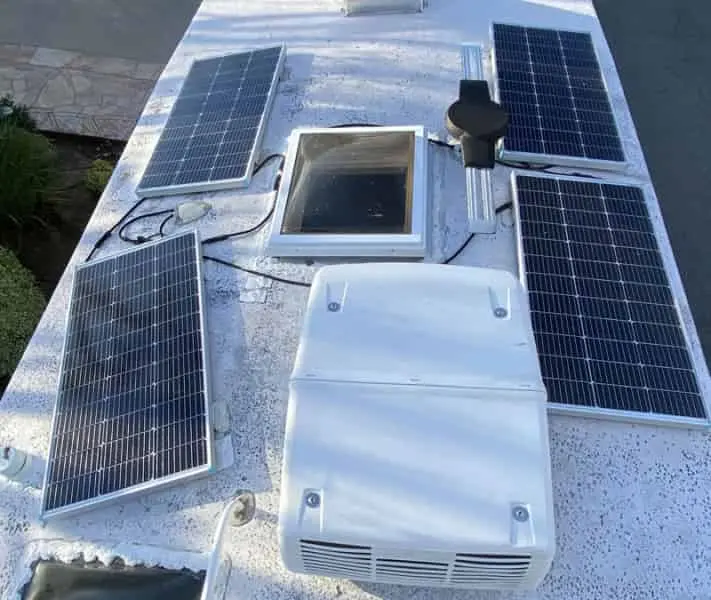
Final thoughts
Using solar power to run your RV air conditioner is absolutely possible with the right setup. By choosing the appropriate solar panels, batteries, inverter, and other components, you can enjoy the benefits of off-grid cooling without relying on gas-powered generators. Though the initial investment may be significant, the long-term savings, environmental benefits, and off-grid freedom make solar an attractive option for RV owners.
Frequently Asked Questions
Can I run an RV air conditioner with solar power alone?
Yes, as long as your solar generator setup is appropriately sized for the air conditioner’s power needs.
How much solar power do I need for a 13,500 BTU air conditioner?
For a 13,500 BTU AC, you’ll need 1,500-2,000 watts of solar power, along with a capable inverter and sufficient battery storage.
How long will solar power keep my RV AC running?
With a 400Ah battery bank and proper solar panel input, a small to medium-sized AC could run for 4-6 hours, and longer with a larger setup.
Is a solar-powered RV AC system cost-effective?
While the initial cost is higher, the long-term savings on fuel and the environmental benefits make solar a worthwhile investment for many RVers..


